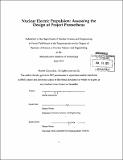Nuclear electric propulsion : assessing the design of Project Prometheus.
Author(s)
Goycoolea, Martin
DownloadFull printable version (2.497Mb)
Other Contributors
Massachusetts Institute of Technology. Department of Nuclear Science and Engineering.
Advisor
Dennis Whyte.
Terms of use
Metadata
Show full item recordAbstract
The high fuel efficiency of electric propulsion makes it a viable alternative for long-distance space travel. Project Prometheus was a NASA-led project that sought to demonstrate that distant electric propulsion missions were achievable by planning an expedition to characterize the Jovian moons of Jupiter. Several requirements were estimated for the electric propulsion system to allow this mission to happen under the budget and technological constraints of the time. Although the mission was terminated early in 2005, many of the design choices during Project Prometheus have affected future long-distance electric propulsion missions. In this thesis the design choices in response to the given constraints in the electric propulsion system are analyzed and evaluated. More specifically, the areas explored include the restriction in the the amount of propellant mass, the choice of propellant used, the specific impulse and power of the thrusters, and the lifetime of the thrusters.
Description
Thesis (S.B.)--Massachusetts Institute of Technology, Dept. of Nuclear Science and Engineering, 2013. "Author: Martin Goycoolea"--title-page. "June 2013." Cataloged from PDF version of thesis. Includes bibliographical references (page 26).
Date issued
2013Department
Massachusetts Institute of Technology. Department of Nuclear Science and EngineeringPublisher
Massachusetts Institute of Technology
Keywords
Nuclear Science and Engineering.